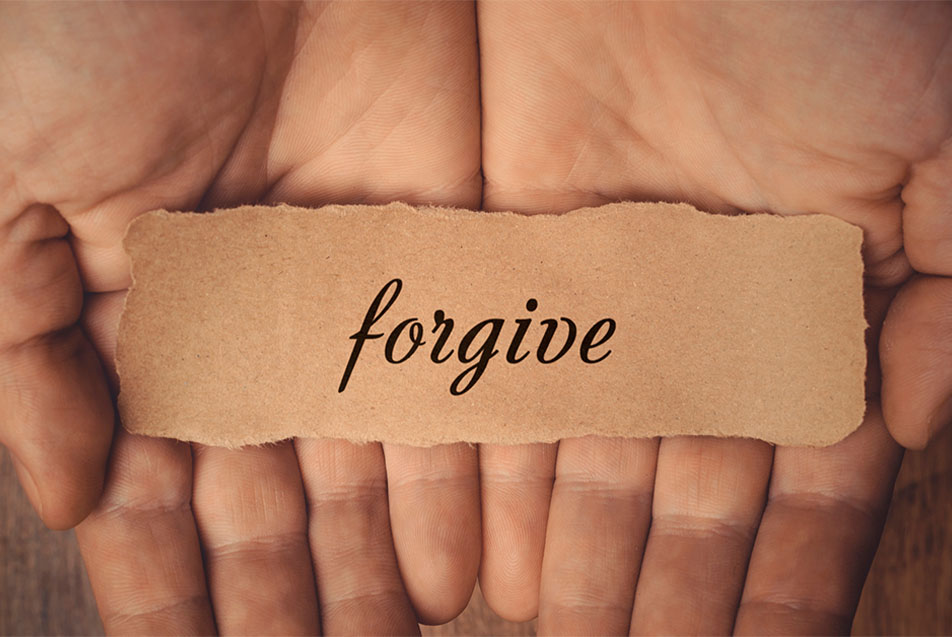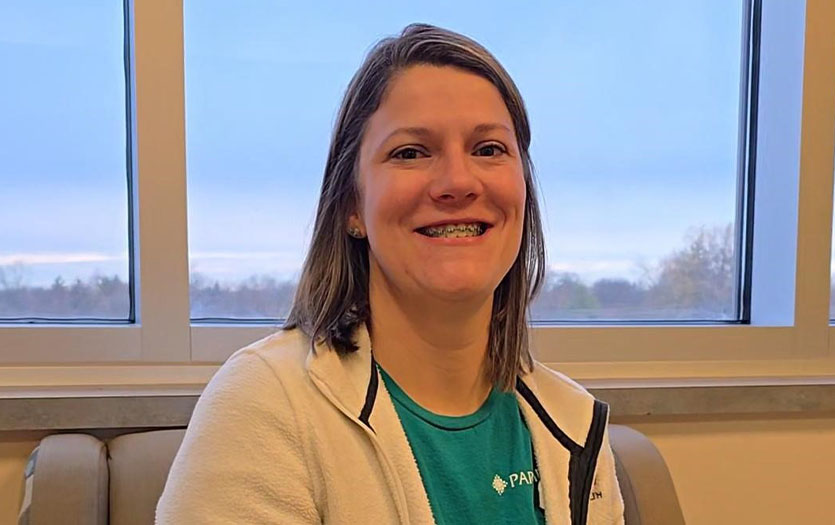
Enjoy this monthly mindfulness post from Dave Johnson, PhD, RN, LMFT, employee assistance specialist.
In the spring of 2004, my youngest son, Paul, asked me if I knew any Jewish Holocaust survivors. He wanted to interview someone as part of an assignment he had for his sixth grade class. I didn’t, but in reflection, I can say we typically find what we are looking for. In the Wednesday evening paper that week, I learned that Eva Moses Kor would be speaking about her experiences as a Holocaust survivor at one of the local Jewish temples. Ah … synchronicity.
Paul and I attended the speaking event with Mrs. Kor. His eyes grew wide as he listened deeply to her survival story of the horrors of the Auschwitz Concentration Camp. He learned that she and her twin sister were separated from her mother and father and other siblings, who were all murdered, at the camp. The twins were “special” and would live but also be subjected to the infamous medical experiments of Dr. Josef Megele. She recounted stories of survival and how it would take many years to heal. “Healing is a skill that society has failed to emphasize,” she stated. “I think healing one’s pain from being a victim should be a skill that one is taught.” *
Mrs. Kor reported that many years later, after her freedom, she would journey back to the camp. In fact, she would return to meet the former Nazi doctor who admitted he had signed the death warrants at the gas chambers. In her address, she said that she had come to FORGIVE the nurses and physicians and other tormenters. As part of the question and answer part of the evening, I asked if the physician requested her forgiveness when she met with him? She said, “No, that was my gift to him, but it became a gift to me, too. I was finally free of what happened in Auschwitz. Emotionally, I was in charge of my own feelings. Forgiveness does not mean absolving the victimizer, they must take responsibility. Rather, it’s learning you have the power to forgive; No one can give it to you and no one can take it away. When a person is hurt, he or she can fall apart or rise above the pain.”
A book signing concluded the evening. As Paul stood next to the chair where Mrs. Kor would sign his book, he came close and eye to eye with her. I knelt next to the table and somehow knew I was in sacred space. I gently touched her left forearm near the serial-number digits of the tattoo branding from Auschwitz. With my touch, she looked up, not into my eyes but deeply into Paul’s.
“How old are you Paul?” she asked.
“I am 11,” he responded.
“I was 11 when I left the camp. Do you think you would have survived, young man?”
Paul hesitated, admitting he wasn’t sure. She asked him what she had taught him that evening. He stammered for just a bit, before looking up at her and responding.
“You taught me to never give up.”
She smiled. “Yes, Paul,” she said, “you would have survived.”
With that, she shook his hand firmly, and handed him the autographed copy. The inscription read:
To Paul,
Never ever give up!
As we drove home, I asked Paul what he hoped to remember from the evening. He said he would never forget meeting Mrs. Kor and her message. I told him that some life lessons are meant never to be forgotten.
As I pondered a topic for this month’s blog post, I considered writing on forgiveness. Forgiveness is, after all, a pillar attitude that I hope to cultivate through the healing practice of mindfulness. But still I wasn’t sure, until I noticed an article in the March 11 edition of the local newspaper. It would seem that Indiana Governor Eric Holcomb had made an inspired choice for the 2017 Sachem Award for a remarkable Hoosier. I was thrilled for her as, almost 13 years ago to the day, Paul and I had in fact met her, Mrs. Eva Moses Kor.
I went to Paul’s childhood bedroom, which has long been vacated, and found the old signed copy and re-read her words inscribed in his book. My choice of topic affirmed, I began journaling and developed the following thoughts:
Honor moments. I am in awe of the synchronicity of life. Practicing the pause of noticing is honoring and being respectful of life lessons. What starts out as a lesson you want for your child or someone else, may serve you personally beyond what you ever dreamed.
Journal. Reflecting by writing lessons learned from the past helps us join with our intentions of staying present. Mindfulness helps us see what is with the intention to stay present. It is a practice of non-judgmental awarenessing. Since life is full of lessons to reflect upon, sometimes coming out of our head and putting pen to paper has a way of making concrete what we need to do to move forward.
Touch. Intentional touch connects our humanity and dignity and can send the electrical impulses we need to learn and heal. I need to continue to reflect upon who and when my heart and mind touches others with kindness, compassion, and courage. Life is messy. Often touch can be healing and gentle.
Award. I seek to remember to value others who display civic courage to speak for the oppressed, poor, and marginalized in our world. Unfortunately, bullies have existed in every society since the beginning of time. Courage is another pillar attitude I hope to encourage in myself and others.
Practice finding voice. Forgiveness is often a process not an event. Speaking with a confidant, minister, counselor, mentor, family member, God, or tree may help you name what you’re really ruminating about. Letting go is cliché, but gently and safely noting fear, anxiety, resentment, anger, confusion etc. doesn’t magnify the emotion, but helps in safe space to recognize the universal nature of raw emotion. Forgiveness may be as much for the forgiver in letting go and doesn’t absolve the victimizer.
Look into the eyes. Compassion and courage of those who have met life challenges can be quickened within me if I take time to look deeply into the eyes. If I practice listening with an openness to learn, I believe I can soak in the life lessons. Perhaps a mindful pause will help with peacemaking and courage to never give up in a sometimes violent and hateful world.
Be grateful. Because life has a way of being brutal, looking for and finding blessings takes a bit of intention. I am thankful for people like Mrs. Kor for touching the lives of many with insights about resilience, forgiveness, healing and courage. I am thankful for Paul for asking to meet a real survivor and sharing a life lesson neither one of us will never forget.
*The Journal Gazette, March 11, 2017, “Holocaust survivor offers an inspirational example.”
Try a guided meditation with Dr. Johnson.
Find a relaxing space and follow along as he leads you through a brief mindfulness practice**.
**Dr. Johnson cautions anyone practicing this meditation to avoid doing so while driving or doing any other activity that requires your absolute concentration.
Mindfulness-based stress reduction practice has been extensively researched and proven helpful for coping with changes, grief, healthy eating patterns, pain, anxiety, depression and many other chronic disease and autoimmune disorders. For more on stress management programs or 1:1 stress coaching with Dr. Dave, contact the Parkview Center for Healthy Living at (260) 672-6500. He also provides on-site guidance for teambuilding, emotional intelligence, and transformational leadership, among other topics. To learn more about Employees Assistance Programs for your company, or enroll in our upcoming seminar, Leadership During Crazy Times: The Zen of Renewal through Mindfulness, call Parkview Business Development at (260) 373-9013.
Read more from Dr. Dave.
Guardian Angels and the seasons of life
How to make meal time an exercise in mindfulness
Follow Dr. Dave.
Facebook: Invisible Inklings
Twitter: @davejohnson2



